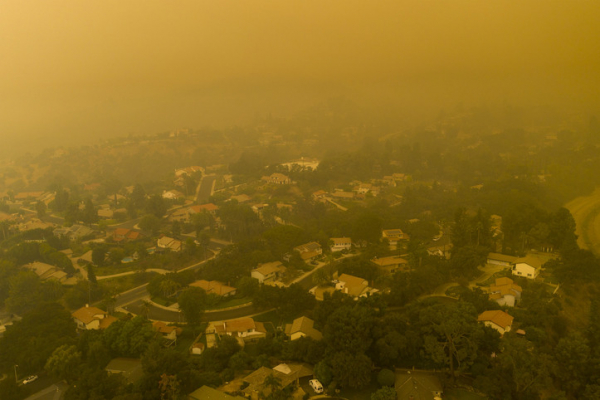One surprising effect of wildfires: Itchy, irritated skin

Are you finding yourself with itchy, irritated skin that you can’t stop scratching? Or have you wondered why your child’s eczema is suddenly worse and so hard to control? Mounting evidence suggests that wildfires, which are increasing in intensity and frequency, contribute to skin problems, including eczema flares.
What is eczema?
Eczema is a common chronic skin condition that affects about one in 10 people in the US. Its hallmarks are inflamed and dry, itchy patches of skin.
Atopic dermatitis is the most common type of eczema. It can run in families, often beginning in childhood. Typically, in the northern hemisphere, it grows worse during the winter season when the weather is cold and drying. Now some experts are seeing that pattern change. At Massachusetts General Hospital, for example, one dermatologist noted an unusual spike last summer in patients with flare-ups of eczema.
Why is eczema getting worse during summer?
In 2023, Canada experienced more than 6,000 wildfires that burned over 16 million hectares of land — an area larger than the entire state of Georgia. While far away from the devastation, the smoke reached across the US and more than 2,000 miles to Europe. Poor air quality from these distant wildfires caused eye and throat irritation and difficulty breathing.
In Boston, Dr. Arianne Shadi Kourosh, a dermatologist at Massachusetts General Hospital, also began to notice skin symptoms. Normally the dermatology clinics would see fewer than 20 people during a summer month for eczema, including atopic dermatitis. Suddenly that jumped to 160.
Looking back at summer month records from the last four years, her research showed that the number of visits for these skin complaints tracked with the severity of air pollution. These findings are consistent with other research noting an uptick in eczema flares and psoriasis flares associated with wildfire pollution. But why?
Researchers theorize that airborne pollutants might set off a cascade of effects within the body by activating an oxidative stress pathway. This damages the skin barrier and prompts an inflammatory response. This cascade also may play a role in the development of eczema.
What can you do to protect your skin?
Air pollutants in wildfire smoke may harm multiple organs — not just your heart and lungs, but also our skin, it seems. So, when outdoor air quality is bad due to wildfires, limiting your exposure can help reduce health risks. While we can say the same for industrial air pollution, wildfire pollution is likely worse due to its additional toxic particles.
- Seek help if you’re itching. Check with a dermatologist or your health team if you think wildfire smoke or other forms of air pollution might be affecting your skin.
- Check local air quality.AirNow.gov shares local, real-time air quality information and activity guidance. When recommended, stay indoors if possible. Shut doors, windows, and any outdoor air intake vents.
- Protect your skin. When you’re outdoors, wear a mineral-based sunscreen containing zinc or titanium. While most other sunscreens work through a chemical reaction to absorb the ultraviolet (UV) rays that damage skin, zinc and titanium sunscreens help by forming a barrier over skin that reflects off UV rays. The barrier also reduces the amount of pollutant particles getting to the skin to set off the inflammatory cascade. Wearing sunscreen protects against skin cancer, as well.
- Wash up. After coming back inside, cleansing your skin and applying a hypoallergenic moisturizer will help keep it healthy. If you do have eczema, choose cleansers and moisturizing products recommended by your dermatologist or health care provider.
About the Author

Wynne Armand, MD, Contributor
Dr. Wynne Armand is a physician at Massachusetts General Hospital (MGH), where she provides primary care; an assistant professor in medicine at Harvard Medical School; and associate director of the MGH Center for the Environment and … See Full Bio View all posts by Wynne Armand, MD